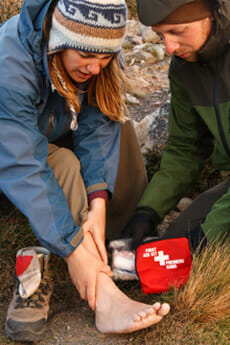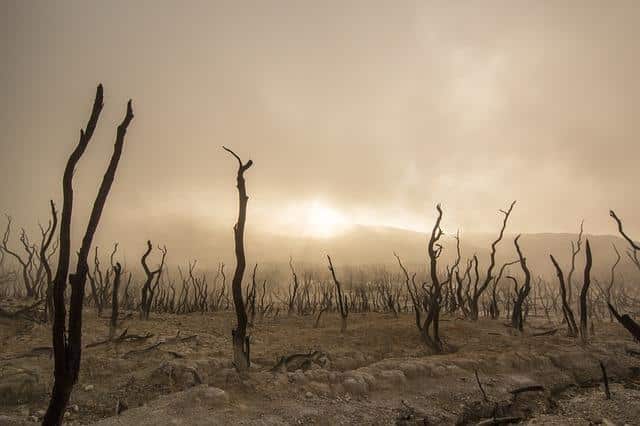It finally happens … the crisis you’ve been preparing for. All that training and stockpiling you’ve been doing is going to start paying off. What you do during the next few days might decide whether you and your family make it through this crisis unscathed. Having the right tools and supplies on hand is going to make a huge difference, but so is using them in the right way.
Depending on the crisis, you may not know it is coming. Some natural disasters, such as hurricanes, give us lots of warning. But other things, such as an earthquake, sneak up on us with no more than a second’s notice. Then there are the situations which aren’t supposed to be a crisis but become one when the storm ends up being bigger than forecasted. Of course, there’s also the chance of a man-made disaster or terrorist attack. At times, our first warning that there’s a problem is when the power goes out.
There’s often a time of confusion at the beginning of any crisis. Rarely do we have all the information at our fingertips about what is happening, nor do we know if it will be a short-term or long-term crisis.
So, what do you do? How do you react? What are the first things you need to use and the first actions you must take to ensure your survival? Obviously, some of these items will be in your survival kit or bug-out bag.
This Tiny Device Can Start A Fire Even In The Worst Conditions [2]
Let’s take a look at what you should have:
1. Radio
Your very first need is going to be information. Without it, you may not even be able to tell what is happening around you. You definitely won’t be able to make a judgment call as to how serious it is. That’s necessary for making decisions about bugging out or bugging in, recalling your family to the home and whether you need to put your disaster plan into effect.
While there are many sources you could use for information, radio is the most reliable. While information also is on television, there aren’t all that many battery-powered TVs around. Plus, such TVs drain batteries.
2. Cell phone
Chances are the crisis will hit when your family is scattered all over town. The modern American family has a busy schedule, with kids scattered around at different activities and both parents working. Once you know what’s going on and make a decision to go into survival mode, you’ve got to get your family together. That means contacting them, letting them know what’s happening and explaining your plan. The cell phone is the most efficient means of doing this, assuming that cell phone systems are still up and running.
As a secondary consideration, you might want to contact your extended family to check up on them and let them know that you’re all right. This can wait until you have your immediate family gathered up, but it might give you something to do while you are driving.
3. Vehicles
If the family is scattered around, you’re going to need vehicles to gather them up. Keep in mind that schools may not be all that willing to let kids go in a crisis situation. As part of your plan, let your kids know that you expect them to leave their classrooms and meet you at the school’s entrance (or possibly an alternate exit point), regardless of what the teacher says. Short of physically restraining them, your kids should be able to get away.
4. Clothing
Once you have everyone at home, you need to immediately go into survival mode. If your electricity is out, you probably don’t have lights, and the refrigerator and heat will be off as well. Since your number one survival need is to keep your body heat in, have everyone change their clothing to something that is more appropriate for keeping them warm. Of course, if the crisis happens in the summer, you’ll need to put on cool clothing to prevent overheating.
5. First-aid kit
 [3]Hopefully none of your family gets hurt in the crisis, but that’s not something you can count on. Chances of injury increase during these times and someone in your family could be hurt. You’re going to have to be ready to switch hats at any time, grabbing the first-aid kit and taking care of their needs.
[3]Hopefully none of your family gets hurt in the crisis, but that’s not something you can count on. Chances of injury increase during these times and someone in your family could be hurt. You’re going to have to be ready to switch hats at any time, grabbing the first-aid kit and taking care of their needs.
Medical facilities tend to get overloaded in crisis situations, due to the high number of accidents. So try to take care of the small stuff at home and only go if there’s a serious enough injury to warrant the care of a doctor.
Of course, that means having a first-aid kit that can handle the rough stuff. If you don’t have a good trauma kit that’s big enough for dealing with large injuries, you’re missing out on an important part of your survival preps. At a minimum, your first-aid kit should provide enough to treat gunshot wounds and broken bones. If it can’t do that, it’s time to add to it.
6. Water and food
Once a crisis hits, you won’t have any idea how long your utilities will last. Therefore, you have to assume that everything will go out and go out soon. While some may last a while, you can’t count on it.
New Water Filter Fits In Your Pocket And Removes 100 Percent Of Water-Borne Bacteria! [4]
Water is going to be one of your biggest needs and one which you will constantly need to be seeking. While you probably have a bunch of water on hand, it’s not going to be enough. Therefore, you should have portable water filters, such as a Paratrooper Filter.
Food with a long shelf life that doesn’t require refrigeration is essential.
7. Alternate heating
What if the disaster takes place during winter? Before your house gets cold, you’ll want to start using your alternate heating. For most of us, that means wood-burning stoves or fireplaces. Start burning some wood, just to get it going. It’s easier to keep your home warm than it is to warm it up once it’s gotten cold.
Your stove or fireplace is only going to be able to keep one room warm, probably your living room or family room. So you want to isolate the heated room from the rest of your house. If you don’t have doors to close it off, hang extra blankets over doorways, blocking out the cold air and holding in the warm.
8. Flashlights/candles
 [5]By now it’s probably getting close to nightfall, so you’ll want to break out the flashlights, candles or oil-burning lamps. Our modern society is not used to stopping our work at sunset and you’ll probably find you have a long list of things you need to do once the sun goes down.
[5]By now it’s probably getting close to nightfall, so you’ll want to break out the flashlights, candles or oil-burning lamps. Our modern society is not used to stopping our work at sunset and you’ll probably find you have a long list of things you need to do once the sun goes down.
Be sparing with your use of your light sources. You don’t know how long they are going to have to last you. Don’t just keep a flashlight on so that you’re not sitting in the dark. Use the light when you need it and then turn it off. Your eyes will adjust to the dark, allowing you to see well enough to walk around your home and do some simple tasks.9. Guns
9. Guns
It is unlikely that many major acts of violence will happen within the first 72 hours after the start of a crisis. Most people will be in shock, trying to deal with the situation and just survive. It won’t be until they run out of supplies that the serious fear will set in and they will start acting irrationally. However, there is always the possibility that someone will snap early, either because they are a bit unstable or because they are already criminally minded and think that stealing is the way to survive.
You’ll want to be ready to defend yourself from the beginning. Hopefully, that won’t be necessary. But in a time of crisis, some people won’t be all that picky about other people’s lives. Your family’s survival may depend on how quickly you react to an attack.
And One More To Consider
When the power goes out, you can count on your refrigerator/freezer keeping things cold for about two days, but that’s it. After that, you either have to consume the food or let it spoil. Of course, there’s another option too: finding some alternate means to preserve it.
A solar dehydrator will allow you to turn any meat you have into jerky, which is probably the best and easiest way to preserve meat. Properly prepared jerky, with enough salt, will last a long time, even without refrigeration. Meat also can be canned if you have a pressure canner. For that matter, just about everything in your refrigerator and freezer can be canned. Better to do that, than to see it go to waste.
What would you add to this list? Share your suggestions in the section below:
Learn How To ‘Live Off The Land’ With Just Your Gun. Read More Here. [6]
